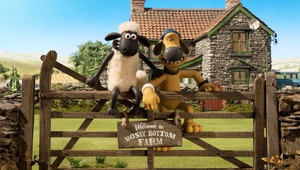
My Biggest Lesson: Simone Giampaolo

Simone Giampaolo is a London-based director and animator with an insatiable appetite for humour and storytelling.
Between 2014 and January 2018 Simone has been working as animation director and CG generalist in the commercial department at Blue-Zoo Animation on a multitude of projects for clients such as Cartoon Network, Disney, LEGO, Nickelodeon, Marvel, Lucasfilm and BBC. Since then he’s been represented as short-form director by Aardman Animations.
Here, Simone gives an insight into his career and what he has learnt.
Q> Is there one event / piece of wisdom from your career that's always stayed with you? What is it?
Simon> I bumped into the most valuable piece of wisdom many years ago, while reading ‘Directing for Animation’, an excellent book written by animation master Tony Bancroft, co-director of Disney’s Mulan.
In the book’s fourth chapter, Tony highlights how vital it is for an animation director to be a strong team-player, and he ends by saying: ‘A good director serves the crew, so that the crew can serve her/his vision.’
This simple concept stuck with me throughout my professional career and has been influencing the way I approach every new project, up to this day.
Q> Set the scene! How old were you when you learned this insight, where were you working, how long had you been there, what year was it, what was your role and how were you feeling generally about your career at this point?
Simon> I was around 23 when I finished my third year of BA (Hons) in Computer Animation at Bournemouth University. During that very intense final year I had to overcome the biggest challenge of my student career: writing and directing an original five minute graduation film. The short, titled Espero?, was created by a small team of five people and took roughly six months to make, from initial concept to final render. That was my very first time directing an actual team of people, an experience I’ll never forget.
The film was well-received and went on to win several awards, as well as being screened at numerous international festivals, such as Annecy and Anima Mundi. Seeing a project you’ve poured your heart and soul into receiving such recognition is truly priceless, especially for a bunch of newbies!
Q> Tell us about the chain of events that led to you learning this insight… be as specific as you can!
Simon> The leap from university to employment wasn’t the smoothest for yours truly, and I had to wait several (long) months before receiving my very first job offer in the British animation industry. During that period of doubt (‘Have I actually chosen the right path?’) and insecurity (‘My stuff isn’t good enough for any studio!’) I spent time trying to improve my skills and reading as much as possible about filmmaking. I also had the chance to finally reflect on my own student work (a kind of ‘self post-mortem’), and particularly on the production of “Espero?”, recalling and analysing what went wrong, what could have been improved and what actually did work well!
I began to question myself: how did I manage to direct the team for six months? What made me succeed as a wannabe-director (it certainly wasn’t my CGI technical skillset, that’s for sure!)? So, what did I do RIGHT?
The lightbulb switched on when reading Tony’s words, in particular the sentence quoted above.
That was it! In spite of making tonnes of mistakes, I always tried to support and help my little crew however I could, especially by communicating with honesty and candour, on a daily basis. I had unconsciously started doing what Tony suggests before I knew it could make the filmmaking process more effective and enjoyable!
People often think of the director as the Big Bad Boss, the one giving orders from above all day long, the psychopath gaining pleasure from making the team change stuff a hundred times! In certain rare cases this can be true, but those aren’t film-directors I’d personally recommend or would want to work with. In most cases, and particularly in animation, the director’s duty is quite the opposite of that: she/ he needs to become the first supporter (or ‘cheerleader’, as Tony says) of the team, the crew’s restless entertainer.
In order to produce their best pieces of work for the film they’re working on, the artists need to feel appreciated, protected and ‘served’ by their director. If the team’s morale flies low, the director should raise it! If an artist encounters a problem with the work station, the director should push to have it fixed as soon as possible. If the production team has doubts about being able to deliver in time, the director should activate and become the conversational link between producers and the art team.
Any crease which could potentially slow down the film’s production should be ironed by the director, not by being the smartest in the room, but by knowing exactly who the smartest people in the room are: the ones who can help solve the problem and make things right again.
Q> Why do you think it struck such a chord?
Simon> Since my childhood, I’ve always been what can be considered an empath: reading and understanding my family members’, friends’ or colleagues’ feelings has always come quite naturally to me. In life, this has pros and cons. Sensitivity is an incredibly useful gift, but comes with a price: I learned it the hard way when I had to battle with depression. Nevertheless, how did this help me progress in my directorial career?
‘A good director serves his crew, so that the crew can serve her/his vision.’ struck a chord because it suddenly let me realise where my real strength might lay!
I’ve never been the strongest craftsman, animator, writer or technical artist in the room: my real forte has always been in the ability to understand others and make my colleagues comfortable and proud to be working on my film (at least, that’s how I like to see it)!
Q> How did it change you as a person and in your career?
Simon> By being able to sense and read a certain vibe, mood or tension from the team, sometimes the director is able to intervene and solve potential problems early on, before they snowball into large delays or catastrophic mistakes.
In the past years I’ve been trying to refine this skill, developing new ways to react to situations, genuinely praising people for their great work, being more available and candid. I still keep making many, many mistakes (that’s human nature), but I’ll always try my best to make the members of my team feel at ease with their tasks and confident in their skills.
Q> Is this insight or piece of advice something you now share with other – if so, how do they respond to it?
Simon> I’ve been teaching Directing and Animation masterclasses on and off for a few years now (collaborating with several British universities and international animation festivals), and I really enjoy it: sharing knowledge and ideas with people makes me happy. I often meet students or recent graduates whose ambition is to become directors, and they often ask me lots of questions about techniques, animation tricks, visual storytelling, recruitment, industry shortcuts, etc. However, at every single talk or presentation I give, I always remember to quote Tony’s piece of wisdom before getting dragged into the nuts and bolts of filmmaking, asking the young aspiring directors: ‘In spite of your technical knowledge, are you willing to sacrifice yourself for the team responsible to keep your film alive?’ If yes, then they’re already on the right path to become good directors.















